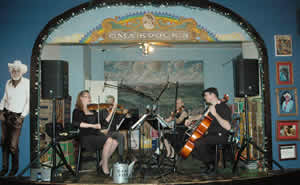 June 12, 2013–All we wanted was to play classical music in a bar. We didn’t know we were part of a revolution.
June 12, 2013–All we wanted was to play classical music in a bar. We didn’t know we were part of a revolution.
It started one cold, dark night back in February when our local string quartet–Theresa Britt, John Reeve, Tammy Widener, and I–stepped on stage at Hondo’s, that Hill Country club that usually features Texas singer-songwriters and dance hall bands.
As we began tuning our A strings, some folks were less than impressed. Two tables got up and left. A few wary patrons hovered at the door, trying to figure out whether a viola was just a big fiddle.
But several souls with adventurous ears stepped inside, took a seat down front, and started “shushing” the crowd so they could enjoy some Brahms, Bach, and Beethoven.
By the end of the first set, there was not an empty seat–or stein–the house.
This fascinated and pleased me. Ever since I discovered the joy of learning to play violin as an adult, I have wondered just when it was the elite decreed that fine art could only be shared in oppressive halls for bejeweled patrons in ties and tails? Weren’t Shakespeare’s plays at the Globe Theater raucous affairs, with heckling crowds skirting the stage? Weren’t classical concerts the rock shows of their time, with ladies tossing undergarments at Liszt the pianist?
But not in my experience. Classical concerts can be like a funeral without a body. Look around about 20 minutes in to a Sunday afternoon concert: fully one-third of the men are nodding off. Why not serve beer and peanuts?
Back at Hondo’s, the crowd did have beer, and was anything but drowsy. Theresa, our fearless and vibrant leader, encouraged the audience to shout out the names of composers of each piece. This group was surprisingly knowledgeable. They knew the theme song to the Lone Ranger was from the Overture by Rossini. They knew Eine Kleine NachtMusik was by Mozart. More important, by the end of the evening they were two-stepping to Beethoven, who probably really was rolling over.
It was great fun. But I didn’t realize we were part of a larger movement called Classical Revolution.
It began in 2006 in San Francisco when violist Charith Premawardhana began organizing free chamber music in cafes. Classical Revolution is now a worldwide phenomenon with dozens of chapters across the country. Rick Robinson of the Detroit Symphony Orchestra is one of the advocates. In an email he wrote that bringing classical repertoire to unexpected settings seemed an obvious way to address the challenge that orchestras were not drawing many young music lovers.
He noted that to the average American, professional symphony traditions seem “sacred, aloof, and cold.” He believes we need to bring the music off the pedestal so everyone can enjoy its beauty and pleasure.
You have another chance to experience it here. On Thursday, our Fredericksburg Community Orchestra will perform for the second time on the outdoor stage at Luckenbach, Texas. That famous venue better known for Willie and Waylon will ring instead with the tunes of Ludwig and Wolfgang.
To me, this accessibility does not demean the music; it elevates it. GK Chesterton wrote that taking yourself seriously is easy. The challenge is recognizing the fun and humor in what we consider art. In fact, being able to embrace a work of art on levels other than pious homage is truly the higher calling.
And what isn’t better with beer?